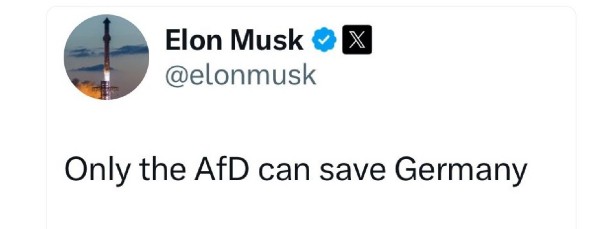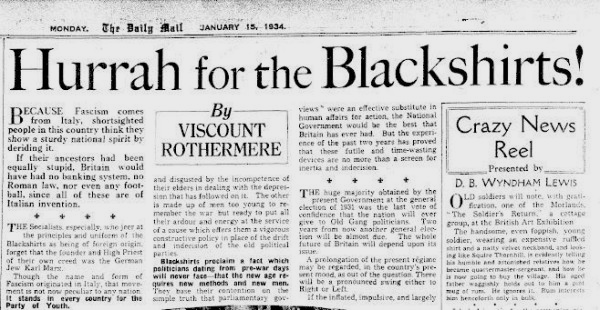Musk’s Rothermere moment
Controversial is perhaps too polite a term to describe the political pronouncements of rich man-baby Elon Musk, particularly as he seems to favour marching on his right foot.
Not content with being best buddies with his latest pal, the disgraced president-elect of the United States, disgraced former 45th president, insurrectionist, convicted felon, adjudicated sexual predator, business fraudster, congenital liar and golf cheat, one Donald John Trump and having a major influence on US politics before the Felon of the Year has even been asked to swear his oath of office, Musk is also now turning his attention to foreign policy.
This was recently illustrated by his recent cosying up to the far right of British politics in the shape of talks about a significant donation to Reform UK, the private fiefdom (and fan club. Ed.) of the mountebank known the world as Nigel Paul Farage that masquerades as a regular British political party.
Musk has now shifted his attention to the eastern shores of the North Sea and more specifically to Germany, where Chancellor Olaf Scholz recently lost a vote of confidence, with a general election due to be held in February.
Yesterday, Musk posted the following on his increasingly right-wing pretend social media platform.

The AfD (Alternative für Deutschland is described in Wikipedia‘s understated manner as a far-right and right-wing populist political party in Germany, although terming it Neo-Nazi would be more accurate given its rampant nationalism and racism.
If one accepts that social media today has as much influence now as newspapers had in the decades after the first war, then a clear parallel can be seen between Musk and one Harold Sydney Harmsworth, also known as ‘Lord’ Rothermere, the proprietor of the Daily Mail in the 1930s, a decade when a disgruntled WW1 veteran was making political waves in Germany.
Following the 1930 German federal election, in which Hitler’s Nazis won 107 out of 577 seats, Rothermere wrote in the Mail that Hitler’s party “represents the birth of Germany as a nation”. This was after the erstwhile Corporal Hitler had made clear his hatred of Jews and belief in racial supremacy in his book Mein Kampf.
In 1934 fascism had spread to establish roots in Britain in the shape of Oswald Mosley’s British Union of Fascists, which was founded in 1932 and otherwise known as the Blackshirts on account of their uniform.
In 1934 Rothermere attached his name to what is doubtless the most notorious headline ever to appear in the Mail, which then as now was telling its gullible readers what to think in the form of a outpouring of praise for Britain’s then nascent fascist party.

Rothermere’s support for the Nazis and their policies were evident right up to the outbreak of war in 1939. When persecuted Jews started fleeing Germany after Kristallnacht in 1938, Rothermere’s Mail responded in typical racist fashion.

Fortunately, Musk will not be able to distort German politics as he is attempting to do in the Untied Kingdom by waving large amounts of cash beneath politicians’ noses. Foreign political donations are expressly forbidden under German law. What is more, Section 25 (2) no. 6 of the Political Parties Act requires political parties to identify donors paying sums exceeding €500. Party statements of accounts must list donations and contributions paid by elected representatives/officials to an amount exceeding €10,000 euros per calendar year, stating the donor’s name and address and the total amount of the donation received. Furthermore, Single donations in excess of €50,000 euros must be reported immediately to the President of the German Bundestag, who will then give notice of the donation and the donor’s name, online and in a Bundestag printed paper as soon as possible.
The time has long since past when the UK should have tightened up on political finance to be as rigorous as Germany.
In the meantime, what effect will Musk’s endorsement of fascists have on the German election in February? One German commentator on social media has already remarked that, apart from financial power being equated with political power, one thing that is not happening in Germany is any discussion that these circumstances are inherently undemocratic and that this influence does not just start with party donations, does not end with the ownership and direct influencing of journalism and the media and thus represents a problem.
Any thoughts? Leave a comment below.